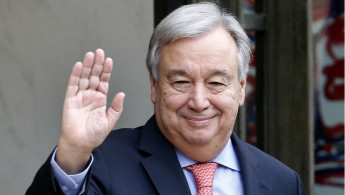UN chief seeks deployment of 75 truce monitors to Yemen
Guterres is seeking approval for the observers to monitor a ceasefire and redeployment of forces belonging to the warring parties for a period of six months, Reuters reported.
The 15-member UN Security Council will need to take action on Guterres’ request by January 20, when a 30-day authorisation for an advance monitoring team currently led by retired Dutch General Patrick Cammaert expires.
The UK said it was working on a draft resolution to approve Guterres’ proposal, however, confirmed it had not yet circulated it to council members.
Guterres described the proposed 75-strong team as “a nimble presence” to monitor compliance of the ceasefire deal and establish and assess facts and conditions on the ground, according to his Dec. 31 proposal to the council.
“Appropriate resources and assets will also be required to ensure the safety and security of U.N. personnel, including armoured vehicles, communications infrastructure, aircraft and appropriate medical support,” Guterres wrote.
“Such resources will be a pre-requisite for the effective launch and sustainment of the proposed mission,” he said.
Guterres said the proposed monitoring mission would contribute to sustaining a “fragile political process” re-launched by UN Yemen envoy Martin Griffiths.
He called on Yemen’s neighbouring states to assist the monitors by “ensuring the free, unhindered and expeditious movement to and from Yemen” of all personnel, equipment, supplies through their territory and the stationing of “support personnel, vehicles and aircraft on their territory.”
'Precarious calm'
Griffiths, met with Yemeni government officials, including President Abedrabbo Mansour Hadi in the Saudi capital Riyadh after meeting rebels in Yemen. He hopes to bring the warring sides together later this month to follow up on progress made at December's talks.
Rebel-held Hodeida was for months the main front line in the Yemen war after government forces supported by Saudi Arabia and its allies launched an offensive to capture it in June.
But a precarious calm has held in the city since a ceasefire agreement came into force on December 18.
Under the deal, both the rebels and pro-government forces should withdraw from the area.
On Thursday, UN spokesman Farhan Haq confirmed the cessation of hostilities continued to hold in Hodeida, despite mutual accusations of violations by the rebels and Saudi-backed government.
But there has not yet been progress on the redeployment of loyalist and rebel forces from Hodeida city.
The UN Security Council is expected to hear a report from Griffiths next week, although no date has been set.
The war between the Houthis and troops loyal to the internationally-recognised government escalated in March 2015, when President Abedrabbo Mansour Hadi fled into Saudi exile and the Saudi-led coalition intervened.
The conflict has unleashed the world's worst humanitarian crisis, according to the UN, which says 14 million Yemenis are on the brink of famine.
The Red Sea port is the entry point for the majority of imports to Yemen, where more than 22 million people now depend on humanitarian aid to survive.
The Sweden talks marked the first meeting in two years between the northern Houthi rebels and the Hadi government.
The last round of talks, hosted by Kuwait in 2016, collapsed after more than three months of negotiations with no breakthrough.
More than 10,000 people have been killed since the Saudi-led coalition intervened in March 2015, although rights group maintain the actual death toll is five times highter.
Agencies contributed to this report.
Follow us on Twitter: @The_NewArab





 Follow the Middle East's top stories in English at The New Arab on Google News
Follow the Middle East's top stories in English at The New Arab on Google News
![The UAE is widely suspected of arming the RSF militia [Getty]](/sites/default/files/styles/image_330x185/public/2024-11/GettyImages-472529908.jpg?h=69f2b9d0&itok=Yauw3YTG)
![Netanyahu furiously denounced the ICC [Getty]](/sites/default/files/styles/image_330x185/public/2024-11/GettyImages-2169352575.jpg?h=199d8c1f&itok=-vRiruf5)
![Both Hamas and the Palestinian Authority welcomed the ICC arrest warrants [Getty]](/sites/default/files/styles/image_330x185/public/2024-11/GettyImages-2178351173.jpg?h=199d8c1f&itok=TV858iVg)